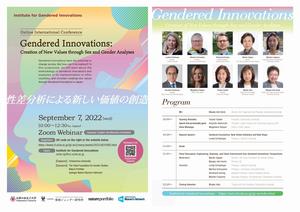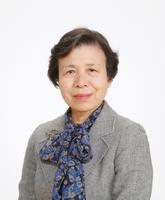- Institute for Gendered Innovations(IGI)
- EVENTS
- International Conference
ページの本文です。
International Conference
2022年8月8日更新
Gendered Innovations: Creation of New Values through Sex and Gender Analyses
Gendered Innovations have the potential to change society. But how can it be realized? In this symposium, we will learn about the methodology of Gendered Innovations and examples of its implementation in other countries, and consider creating new values through Gendered Innovations in Japan.
Ochanomizu University established the Institute for Gendered Innovations (IGI) in April 2022, and this conference is the second of its kick-off symposia series. The main objectives of this conference are to disseminate the latest information on Gendered Innovations research and share an in-depth international discussion on Gendered Innovations with the Japanese audience.
Guest Speakers
Londa Schiebinger (Professor, Stanford University)
Martina Schraudner (Professor, Technische Universität Berlin)
Rembrand Koning (Assistant Professor, Harvard Business School)
|
International Conference Outline |
|
|---|---|
|
Date |
Wednesday, September 7, 2022. 10:00–12:30 (in Japan) and 3:00–5:30 (in Germany). |
|
Venue |
Zoom Webinar (admission free, registration required) |
|
Audience |
Open to the public |
|
Language |
English and Japanese with simultaneous interpreting |
|
Organizer |
Ochanomizu University |
|
Sponsors |
The Tokai Foundation for Gender Studies |
|
Inquiry |
Institute for Gendered Innovations ocha-igi@cc.ocha.ac.jp |
Program
MC: Masako Ishii-Kuntz (Director, IGI/ Trustee and Vice President, Ochanomizu University)
|
10:00-10:20 Opening (20 min.) |
|
|---|---|
|
MC’s opening statement |
|
|
10:20-11:00 Keynote Speech (40 min.) |
|
|
Gendered Innovations: New Global Initiatives and Next Steps |
|
|
11:00-11:10 Break |
|
|
11:10-12:25 Panel Discussion (75 min.) |
|
|
Engineering, Business, and Urban Environment from Gendered Innovations’ Perspectives Moderators Mariko Ogawa (Director , The Tokai Foundation for Gender Studies) Panelists Londa Schiebinger (Professor, Stanford University) |
|
|
12:25-12:30 Closing (5 min) |
|
|
Closing Remarks: Misako Kato (Trustee and Vice President, Ochanomizu University) |
|
Keynote Speech
Gendered Innovations: New Global Initiatives and Next Steps
Londa Schiebinger
Gendered Innovations in Science, Health & Medicine, Engineering, and Environment harness the creative power of sex, gender, and intersectional analysis for discovery and innovation. My talk will address the latest global developments in Gendered Innovations. Methodologically, we will explore how sex and sex interact, how sex and gender interact, and what is intersectionality and what it is important. New case studies will include haptics, space travel, fast fashion, intersectional robots, and new efforts to integrate social analysis into core medicine, engineering, and computer science courses. We will also discuss policy initiatives—our new global study of national funding agency policy in Japan played an important role, new journal guidelines at Nature and others, and what universities need to do to support these efforts. Participants may wish to read: Sex, Gender Analysis Improves Science and Engineering Nature (2019). For late-breaking news on research in this area, join the Gendered Innovations listserv.
[Recommended Pre-reading material]
Londa Schiebinger. “Gendered Innovations: Enhancing Excellence in Science & Technology” GRL Studies, Vol.4, 9-22 (2022).
**********
Londa Schiebinger is the John L. Hinds Professor of History of Science at Stanford University, and Founding Director of Gendered Innovations in Science, Health & Medicine, Engineering, and Environment. She is a leading international expert on gender in science and technology and has addressed the United Nations, the European Parliament, and numerous funding agencies on the topic. Schiebinger received her Ph.D. from Harvard University and is an elected member of the American Academy of Arts and Sciences. She is the recipient of numerous prizes and awards, including the prestigious Alexander von Humboldt Research Prize and Guggenheim Fellowship. She has been awarded Honorary Doctorates from the Universitat de València, Spain, 2018; Lunds Universitet, Sweden, 2017; Vrije Universiteit Brussel, Belgium, 2013. Her prize-winning books include: The Mind Has No Sex? Women in the Origins of Modern Science (Harvard University Press, 1989); Nature’s Body: Gender in the Making of Modern Science (Beacon Press, 1993; Rutgers University Press, 2004); Has Feminism Changed Science? (Harvard University Press, 1999); Plants and Empire: Colonial Bioprospecting in the Atlantic World (Harvard University Press, 2004); Gendered Innovations: How Gender Analysis Contributes to Research (European Commission, 2013); Secret Cures of Slaves People, Plants, and Medicine in the Eighteenth-Century Atlantic World (Stanford University Press, 2017); Gendered Innovations 2: How Inclusive Analysis Contributes to Research and Innovation (European Commission, 2020; with Robert N. Proctor, Agnotology: The Making and Unmaking of Ignorance (Stanford University Press, 2008). Her books have been translated into numerous languages.
Panelists
Prof. Dr. Martina Schraudner holds the chair of "Gender and Diversity in Technology and Product Development" at the Technical University of Berlin, has established the Center for Responsible Research and Innovation of the Fraunhofer IAO and has been on the board of acatech- Deutsche Akademie der Technikwissenschaften e.V. from January 2018 to December 2021. She is concerned with methods, instruments and processes that make different perspectives accessible and usable for innovation processes. Martina Schraudner is active in national and international selection committees for application-oriented research and innovation projects, and especially interested in “diverisified innovations”. She is a member of the University Council of the University of Paderborn and of the University of Landshut, of the Board of Trustees of the European Academy for Women in Politics and Business (EAF) and of the Board of the Competence Centre for Technik-Diversity-Chancengleichheit e.V.
***********
Dr. Rembtand Koning is an Assistant Professor of Business Administration in the Strategy Unit at Harvard Business School. Professor Koning studies how managers and entrepreneurs discover new ways to create value. His work explores how bias in how we discover hinders firm performance, leads managers to overlook promising new practices and talent, and drives inequities in who benefits from innovation and competition. However, his research also shows how companies can counter biases in discovery to build better strategies and more inclusive innovations.
To understand how firms and entrepreneurs discover his work builds on ideas from a range of disciplines, including sociology, economics, and business strategy. It also relies on a range of methods, including randomized control trials (RCTs), text analysis, and machine learning approaches. He has studied entrepreneurs and firms worldwide and in various industry contexts, including online startups, scientific discovery, biomedical innovation, and retail trade. His papers have explored how social skills improve matching and diffusion in small business advice networks, how A/B testing enables the discovery of product-market fit, how male-dominated online platforms can distort the direction of product innovation away from the needs of women, how shifts in the boundary of the firm have led US companies to miss out on diverse talent, and how the demographic background of innovators impacts who benefits from innovation.
**********
Dr. Mamiko Fujiyama is an associate professor at the Center for AI and Data Science at Ochanomizu University. Urban and architectural design is her primary field of research, which focuses on the integration of various technologies and urban environments, and the formulation of in-between spaces and transitional boundary in contemporary urban space. Considering the spatial epistemology perspective, she argues that the forms of architecture and urban space, as well as the users’ perceptions, are determined not only by external factors such as functional and technical conditions and linguistic descriptions but also by the internal factors that manage the syntax of historical, cultural, and social backgrounds. Her research covers a wide array of topics, including the extension of energy information visualization technology, which suggests users to exhibit environmentally conscious behavior in information–experience spaces, verification of the energy-independent toilet environments from the disaster resilience perspective, and the potential of developing design and construction processes using technologies such as drones and digital fabrication.
As a researcher at the Institute for Gendered Innovation, she examines the conventional spatial norms in urban and architectural design from a gender-sensitive perspective. Her current research pertains to all-gender toilets and the creation of inclusive toilet environments.
**********
Moderator
Mariko Ogawa is Professor Emerita of History and Philosophy of Science at Mie University. She received her Ph.D. from the University of Tokyo in 2012. She is the author of Feminism and Science/Technology (Iwanami Shoten 2001), Darwin Redux (Iwanami Shoten 2003), and Germs and the State (Nagoya University Press 2016). Her extensive translation work includes four of Schiebinger's major books and the European Commission's Women in Industrial Research. She wrote several introductory articles about Gendered Innovations in Japanese. She received the Sawayanagi Masataro Memorial Tohoku University Gender Equality Award (2017) and the Prime Minister's Commendation for Gender Equality in 2022.
関連ファイル / Related Files
PDFファイルの閲覧には、Adobe Acrobat Reader DC(新しいウインドウが開き、お茶の水女子大学のサイトを離れます)が必要です。











 Poster PDF(PDF形式 807キロバイト)
Poster PDF(PDF形式 807キロバイト)














